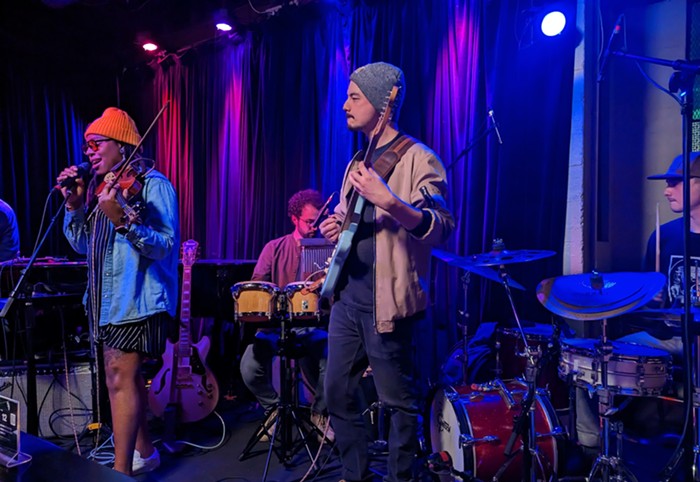Las Vegas is America's glittering beacon of hard luck and high dreams, but the cavernous echo of Glasvegas is unmistakably Scottish. It's an exquisite but harrowing sound without a trace of artifice or glamour, despite being boiled alive in pedals and effects. And while Glasgow certainly has its share of bands—Belle and Sebastian, Franz Ferdinand, Camera Obscura, to name just a few—the working-class quartet Glasvegas has a decidedly less collegiate sound.
"Glasgow has two sides," says bassist Paul Donoghue. "There's the West End, where most bands spring up from, but this is made up of people from outside Glasgow going to university or chasing a dream and migrating in. If you walk down there on any given day you'll meet artists, photographers, bands, whatever. We're from the East End though, where you have a band every 30 years or so, like a fucking comet coming into view in the night sky."
It's another Scottish band, however, that provokes the easiest comparison: The Jesus and Mary Chain shoved the girl-group sounds of the '60s into a clanging warp of fuzz, their sugar-sweet melodies transformed into wasp-like stings. Glasvegas is not nearly as abrasive, but their sound is huge, simple guitar lines and Spector-esque drums magnified to cataclysmic proportions through the magic of reverb. Indeed, the band caught the ear of Alan McGee—the former head of JAMC's label, Creation Records—who championed the band before they signed to major-of-all-majors Columbia Records.
"We had the choice to go with a lot of labels—indies and majors—but Columbia felt right," Donoghue explains. "We want to get the music out to as many people as possible so a major allowed us to push the album as much as we could."
Despite their larger-than-life, arena-ready sound, the songs of Glasvegas frontman James Allan are remarkably sensitive, and straightforward to the point of blunt. A one-time soccer player, Allan's melodies revolve around a couple chords at most, their simplicity bolstering their blaring power, like a bagpipe soaring up and down a confined modal range of notes. His lyrics—as in the tremendous "Flowers and Football Tops," whose title refers to what is left at the death site of someone who's been killed in the UK (a "football top" being a soccer jersey), or "Daddy's Gone," the lamentations of which are obvious from the title—manage that unique Scottish trick of being sad as all fuck without ever turning maudlin.
"When we first started out we were different from what we sound like now," says Donoghue. "We were almost rockabilly, and to get excitement in the music we played faster. It took a while but we realized that by stripping some of the fat off the songs they sounded more like James had imagined.... What you hear on the record is the way James strived to record these songs for years. A lot of the guitar effects are a product of trying every pedal and amp in the studio—I mean every pedal!—'til we found what we liked. The echo and reverb help us to achieve an orchestral sound. Some guitar or drum parts are very minimal to allow other shimmers of light to come to the fore."
Glasvegas' self-titled debut has already been followed up by a Christmas EP of sorts; the six-song A Snowflake Fell (And it Felt Like a Kiss) was recorded in a 16th century fort in Transylvania with the help of a Romanian choir. The band is poised for enormous success—Glasvegas already hit #2 in the UK—but the backlash may already be in effect: Their Wikipedia page at one point redirected to the page for the human anus.
"We've had a lot of luck and worked really hard," says Donoghue. "Where we're from, if you're in a band you better be fucking steeled for criticism cause it's coming your way from everyone: people you know who think it's a waste of time and that you need a 'real job,' and people in [other] bands who are xenophobic and don't want the rats from the gutter dirtying their stage. Not that we're martyrs or anything. We're oblivious to everything that gets leveled at us."



















